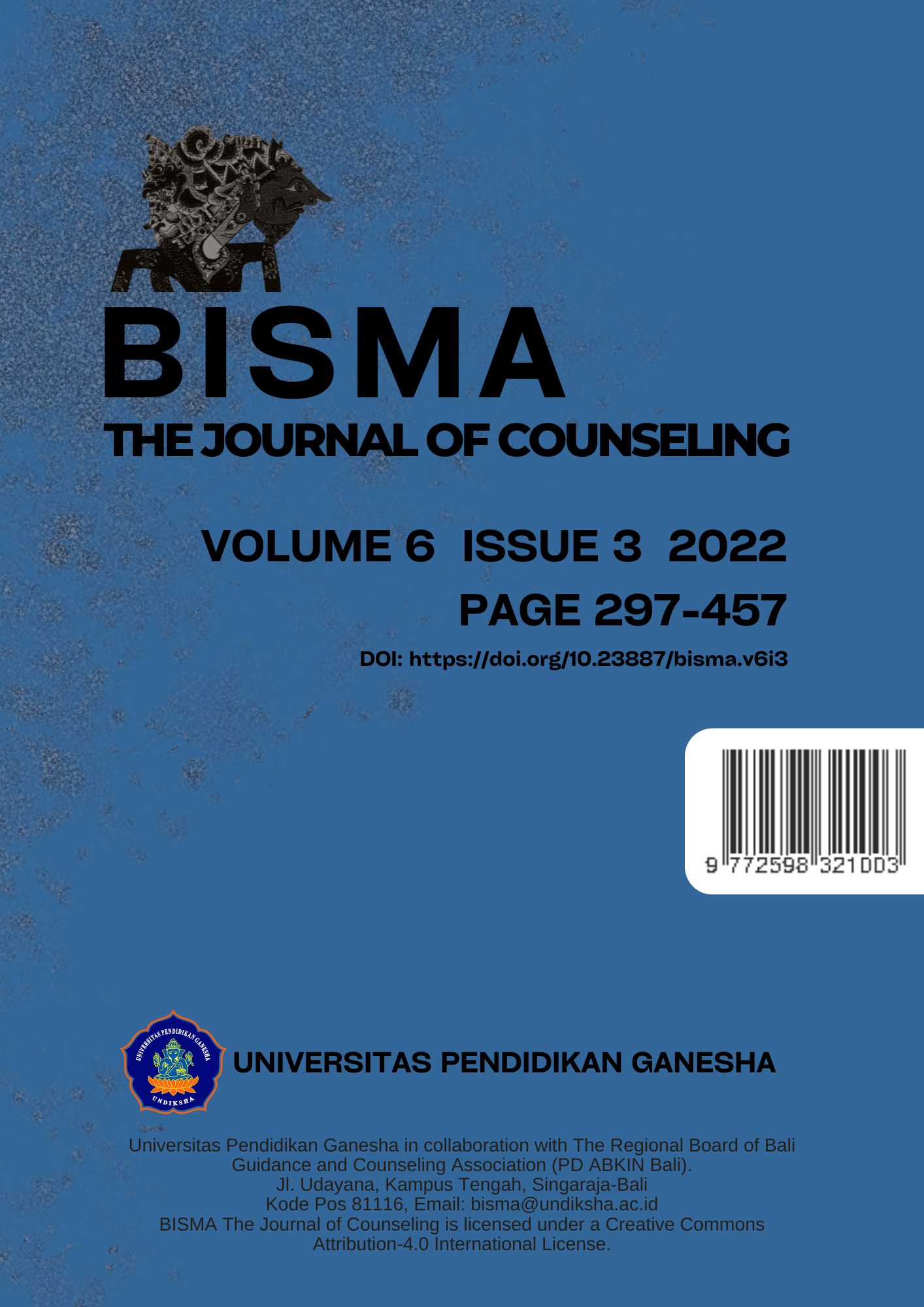Is There a Difference in the Self Efficacy of Students with Academic and Non-Academic Achievements (Sports Field)?
DOI:
https://doi.org/10.23887/bisma.v6i3.53297Keywords:
Self-Efficacy, academic achievement, sport achievementAbstract
This research was conducted to analyze the differences in the level of self-efficacy of students with academic achievements and non-academic achievements majoring in MIPA and Social Sciences. The research method used is quantitative research using survey methods. The research subjects were taken by purposive sampling technique with a sample size using the Yamane formula of 50 students with academic achievements and 38 students with non-academic achievements. The instrument used in data collection is using a self-efficacy scale. Data analysis used comparative analysis with the Independent Sample T Test. The results of the study show that: 1) The self-efficacy of students with academic achievements is in the moderate category, 2) The self-efficacy of students with non-academic achievements is in the moderate category, and 3) The results of the Independent Sample T Test, the research hypothesis is rejected. So it can be concluded that there is no difference in the self-efficacy of students who achieve academically and non-academic achievers.
References
Alim, A. (2019). Hubungan Motivasi, Attitude, Anxiety Dan Self Efficacy Terhadap Prestasi Atlet Tenis Lapangan Level Junior Dan Senior. Medikora, 17(2), 83–90. https://doi.org/10.21831/medikora.v17i2.29179
Arikunto, S. (2002). Prosedur Penelitian Suatu Pendekatan Praktek Edisi Revisi V. Rineka Cipta.
Azwar, S. (2012). Penyusunan Skala Psikologi. Pustaka Pelajar.
Bandura, A. (1995). Self-efficacy in Changing Societies. Cambridge University Press.
Chairiyati, L. R. (2013). Hubungan Antara Self- Efficacy Akademik dan Konsep Diri Akademik dengan Prestasi Akademik. Humaniora, 4(2), 1125–1133.
Durović, D., Popov, S., Soki, J., Gruji, S., & Veljković, A. A. (2021). Rethinking the Role of Anxiety and Self-Efficacy in Collective Sports Achievements. Primenjena Psihologija, 14(1), 103–115. https://doi.org/10.19090/pp.2021.1.103-115
Ghufron, M. N., & S, R. R. (2014). Teori- Teori Psikologi. Ar-Ruzz Media.
Harapan, D. (2011). Analisis Hubungan Antara Efikasi-Diri Siswa dengan Hasil Belajar Kimianya. Jurusan Pendidikan Kimia UMTS, 42–53.
Hardianto, G., Erlamsyah, E., & Nurfahanah, N. (2016). Hubungan antara Self-Efficacy Akademik dengan Hasil Belajar Siswa. Konselor, 3(1), 22. https://doi.org/10.24036/02014312978-0-00
Heazlewood, I., & Burke, S. (2011). Self-efficacy and Its Relationship to Selected Sport Psychological Constructs in the Prediction of Performance in Ironman Triathlon. Journal of Human Sport and Exercise, 6(2), 328–350. https://doi.org/10.4100/jhse.2011.62.14
Indirwan, Suarni, W., & Priyatmo, D. (2021). Pentingnya Self-Efficacy terhadap Prestasi Belajar Matematika. Jurnal Sublimapsi, 2(1), 61–70. https://doi.org/10.36709/sublimapsi.v2i1.13055
Kurniawan, A. W., & Puspitaningtyas, Z. (2016). Metode Penelitian Kuantitatif. Pandiva Buku.
Marjono. (2018). Rahasia Sembilan Kiat Sukses Siswa Berprestasi (S. Lestari (ed.)). LPPM Institut Agama Islam Ibrahimy Genteng Banyuwangi. https://play.google.com/books/reader?id=JZKnDwAAQBAJ&pg=GBS.PP4&hl=id
Mukti, B., & Tentama, F. (2019). Faktor-faktor yang mempengaruhi efikasi diri akademik. Prosiding Seminar Nasional Magister Psikologi Universitas Ahmad Dahlan, 0(0), 341–347. http://seminar.uad.ac.id/index.php/snmpuad/article/view/3442
Nauvalia, C. (2021). Faktor eksternal yang mempengaruhi academic self-efficacy: Sebuah tinjauan literatur. Cognicia, 9(1), 36–39. https://doi.org/10.22219/cognicia.v9i1.14138
Olivier, E., Archambault, I., De Clercq, M., & Galand, B. (2019). Student Self-Efficacy, Classroom Engagement, and Academic Achievement: Comparing Three Theoretical Frameworks. Journal of Youth and Adolescence, 48(2), 326–340. https://doi.org/10.1007/s10964-018-0952-0
Rosyid, M. Z., Mustajab, & Abdullah, A. R. (2014). Prestasi Belajar (H. Sa’diyah (ed.)). Literasi Nusantara.
Setiawan, M. A. (2018). Model Konseling Kelompok Teknik Problem Solving Teori dan Praktik untuk Meningkatkan Self Efficacy Akademik. Deepublish.
Setiawati, L., & Sudira, P. (2015). Faktor-Faktor Yang Mempengaruhi Prestasi Belajar Praktik Kejuruan Siswa Smk Program Studi Keahlian Teknik Komputer Dan Informatika. Jurnal Pendidikan Vokasi, 5(3), 325. https://doi.org/10.21831/jpv.v5i3.6487
Supardi. (2017). Statistik Penelitian Pendidikan Perhitungan, Penyajian, Penjelasan, Penafsiran, dan Penarikan Kesimpulan. Rajawali Press.
Susanti, L. (2019). Prestasi Belajar Akademik & Non Akademik (A. Hamzah (ed.)). Literasi Nusantara.
Downloads
Published
Issue
Section
License
Copyright (c) 2022 M. Arli Rusandi, Lisa Khairani, Elni Yakub

This work is licensed under a Creative Commons Attribution 4.0 International License.








